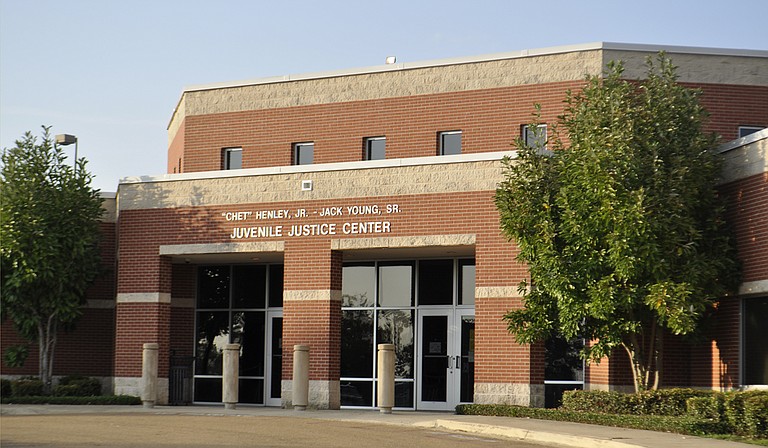The Southern Poverty Law Center sued Henley-Young Detention Center, based in Hinds County, for neglecting children detained there. Trip Burns/File Photo
Wednesday, March 16, 2016
After a long fight against oppressive juvenile-justice policies and negligent practices in Mississippi, 2012 was a watershed year for juvenile rights in Mississippi. That session, Gov. Phil Bryant established the Juvenile Detention and Alternatives Task Force when he signed Senate Bill 2598 into law.
The group, made up of all public employees, including juvenile court judges and other law enforcement, banded together to draft necessary reform to Mississippi's juvenile-detention centers, which had long mentally, physically, and emotionally neglected and mistreated the youth residing there.
The work of the task force since then informed HB 1481, or the Mississippi Juvenile Detention Facilities Licensing Act, that Rep. Linda Coleman, D-Mound Bayou, sponsored this session. The bill calls for uniform standards for the management of juvenile-detention facilities across the state.
Before the turn of the century, Mississippi built juvenile facilities in order to remove minors from adult institutions because, at the time, separate facilities did not exist. But even with separate facilities, juvenile-detention centers in the state have so far operated without a system in place to guide its development past initial organization, and the effect of such neglect was obvious.
The Southern Poverty Law Center says the state "funneled children into abusive and filthy detention centers" and that its juvenile-justice system "warehouses" children who "frequently endure brutal physical abuse, prolonged isolation and denial of medical, mental health and educational services."
Ending the Abuse
The SPLC and Disability Rights Mississippi sued Henley-Young Juvenile Detention Center in Jackson in 2011, alleging such abuses as "forcing children to stay in small cells for 20 to 23 hours every day with little human contact, exercise or access to education and rehabilitation programs; verbally abusing and threatening physical harm to children and their families; and withholding medication from children with serious mental-health problems."
Jody Owens II, an attorney at the Southern Poverty Law Center who was part of the task force, says the establishment of statewide licensing standards will affect the state, which has seen five class-action lawsuits from his office regarding the treatment of juvenile offenders.
"The purpose of these facilities is to rehabilitate kids, not to punish them," he told the Jackson Free Press.
Limited resources prevented the state from having a uniform approach to juvenile-detention center administration in the past, Owens says. In the way that Mississippi has a Department of Corrections and Department of Education, in other states, like Florida, they also have a Department of Juvenile Justice that handles the governing of juvenile-detention centers. Without a state agency, individual counties handle their juvenile-detention centers independent of any standard oversight. Of Mississippi's 82 counties, only 17 serve the need for juvenile-detention centers. Counties without centers must pay receiving counties that do have them to inter their youth offenders.
This session's Mississippi Juvenile Detention Facilities Licensing Act attempts juvenile-detention center reform by making the facilities accountable to a system that requires them to be licensed to detain minors who commit crimes.
By Oct. 1 of this year, the bill would require a mock review of all facilities in order to nudge them into compliance by a set date, but not without teeth. Those not in compliance would be subject to fines or suspension until they can prove that their institution is a safe space for offenders, and doesn't operate in order to violate their civil rights.
'Make Sure We Do It Right'
Rankin County Youth Court Judge and juvenile-justice champion Thomas Broome, co-chair of the task force, says the bill is common sense-oriented.
"Basically, it's a culmination of a multiple-year process where all of the interested entities that are involved in juvenile justice, in particular detention, have all participated in a collaborative effort to define what our detention facilities should provide in order to make sure that they're safe and secure, but also to provide a rehabilitative environment for the children that are in them," Broome told the Jackson Free Press.
"What this bill does is help to standardize that, and establishes minimum standards across the state."
The judge said the effort to reform detention centers boils down to "a common-sense approach to making our system somewhat uniform so that a child in any area of our state and their family have certain expectations of what they should expect to see in their detention facility."
"Our hope is that children don't have to go to detention. Detention is our last option on our choices, but there are some cases that require detention, and those that do, we want to make sure that we do it right," Broome said.
Fixing Juvenile Justice
If it becomes law, this session's juvenile-justice bill, HB 1481, would: require background checks and child-abuse registry checks of all juvenile detention administrators and staff, and the licensing agency would have the authority to disqualify them from job candidacy; require all juvenile detention centers to develop and implement policies and procedures that comply with the regulations of the Juvenile Facilities Monitoring Unit; forbid the establishment or operation of any juvenile-detention center without a license; require no less than two inspections a year of each detention center by the licensing agency; forbid the housing of any child in any detention center that does not comply with; absolve the child from incrimination due to statements made in screening or assessment; require the compliance of the Department of Education in making sure that all students detained would still receive the educational services of their school district.
Bills to Watch:
HB 772: An act to authorize youth court judges to appoint counsel to represent an indigent parent or guardian, in proceedings regarding the termination of parental rights.
SB 2607: An act to create the Mississippi Achieving a Better Life Experience, or (ABLE) Act. The bill intends to establish an ABLE program under the Internal Revenue Code to promote saving private funds in tax-exempt accounts to pay expenses for individuals with disabilities such as education, housing and transportation.
HB 1534: Would exempt school districts with A and B accountability ratings from some statutes, including accountability to the state Department of Education.
Sierra Mannie is an education reporting fellow for the Jackson Free Press and the Hechinger Report. Email her at [email protected]. For more education stories visit jfp.ms/education.


Comments
Use the comment form below to begin a discussion about this content.
Sign in to comment
Or login with:
OpenID